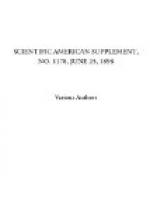The wild Tuaregs of the Sahara have a system of phonetic writing used by a few of them—the women being the literati of those tribes (the men not knowing how to read or write); but civilization means more than this; it means the use of iron weapons and tools; it means also the adoption of a definite currency which is established on a fixed basis and recognized throughout the community; it means the establishment of commercial lines—a progress distinct above that which is the mere barter of the lower conditions of savagery and barbarism. In all these respects we see that civilization means a type about such as we enjoy at present. It is such as has existed in Europe since the Renaissance; because during the middle ages we could only say that Europe was in a semi-civilized condition. They knew something about writing; but at a time when Dean, the writer of the early history of England, said that throughout the whole of England there were not half a dozen men who could read what he had written, you can see that writing was a very unimportant part of the culture of that nation; so it can only be when writing becomes a common possession of the majority that we can call it an element of civilization.
It is not to be supposed that we ourselves have reached the type of the highest culture. We leave something for our descendants to do. We do not wish to relieve them of the privilege of being better than ourselves; and we shall leave them, probably, plenty of room; because it is supposed that the stage of enlightenment which is the highest stage of culture—which we foresee, but do not see—that that rather applies to the future than to ourselves. That period will come when mankind has freed itself very much more than now from the bonds of nature and the environment of society. It will come when the ideas of our equality are much more perfect than they are now; when that equality extends to the equality of women with men before the law and in all rights; when it comes to the equality of all men of all castes before the law and the equal opportunity of all men to obtain that which is best in the life of all. We are very far from that yet. It will come also when the idea of international legislation is such that it will not be necessary, in order to cure great evils, that we should have recourse to weapons of any material whatsoever; that time is not yet come; and so we have much that is left for our descendants to work out in this direction.




